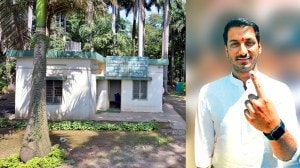Decode Politics: Delhi Assembly nears end of year without Question Hour. Why the practice is important
In both Parliament and individual state Assemblies, question hours have helped shed light on important topics.
 In both Parliament and individual state Assemblies, Question Hours have helped shed light on important topics. (Screengrab/ Express video)
In both Parliament and individual state Assemblies, Question Hours have helped shed light on important topics. (Screengrab/ Express video)While it has had over two dozen sittings so far, the Delhi Assembly has not had a single Question Hour this year. In 2023, the 70-member House, where the ruling Aam Aadmi Party currently has 59 MLAs and the BJP has seven, saw all of two Question Hours.
Question Hours were conceived as crucial for the functioning of Parliament and Assemblies, giving legislators the opportunity to put in public domain information about administrative functioning, government projects, and funds. In both Parliament and individual state Assemblies, Question Hours have helped shed light on important topics.
Recently, ahead of the Special session in which Atishi took over as Delhi CM, the BJP said it would demand a Question Hour. The party’s legislature leader Vijender Gupta saying it wanted to highlight the non-formation of the Sixth Delhi Finance Commission, the Delhi Jal Board’s Rs 73,000-crore debt, financial “irregularities” in the construction of 24 hospitals, and “corruption” in educational institutions such as the Delhi Skill and Entrepreneurship University (DSEU)”.
The Question Hour practice
The Delhi Assembly website says: “Members have a right to ask questions to elicit information on matters of public importance from the Government”, and that Question Hour “is the most popular device available to a member to raise issues in the House”.
Rule 29 of the Delhi Assembly Rules states that a question must relate to a matter of administration for which the Government is responsible, while its “purpose should be to elicit information or to give suggestions of action on a matter of public importance”.
There are three types of questions. Starred Questions, where a member desires an oral answer in the House and the Minister replies on the floor of the House. Supplementary questions are also allowed with the permission of the Speaker, along with the starred questions.
Then there are unstarred questions to which a written reply may be given to the member concerned and on which no supplementary question is permissible.
The Speaker decides the admissibility of a question.
In Parliament
The Constitution does not contain any mention of special sessions, how they can be called (except in the case of an emergency if regular sessions haven’t been held), and how they are conducted. As such, the procedures for them are unclear.
However, Question Hour is a well-known convention and is considered the liveliest hour in Parliament. It is during this one hour that Members of Parliament ask questions of ministers and hold them accountable for the functioning of their ministries. The questions that MPs ask are designed to elicit information and trigger suitable action by ministries.
Over the last 70 years, MPs have successfully used this parliamentary device to shine ight on government functioning. With its broadcast since 1991, Question Hour has also become one the most visible aspects of parliamentary functioning.
Prior to Independence, the first question asked of the government was in 1893. It was on the “burden” cast on village shopkeepers who had to provide supplies to touring government officers.
Question Hour in both Houses of Parliament is meant to be held on all days of a Session, barring two days. There is no Question Hour on the day the President addresses MPs from both Houses in the Central Hall. The President’s speech takes place at the beginning of a new Lok Sabha and on the first day of a new Parliament year. Question Hour is not scheduled on the day the Finance Minister presents the Budget either. Since the beginning of the current Lok Sabha, approximately 15,000 questions have been asked in the Lower House.
Instances of Question Hour being scrapped
The last time Question Hour was scrapped in Parliament was during the pandemic-hit Monsoon Session in 2020.
Then Leader of Opposition in Rajya Sabha Ghulam Nabi Azad wrote to the House Chairman M Venkaiah Naidu conveying his reservation over the decision. In his letter, Azad is learnt to have stated that it would be inappropriate to curtail them since they give MPs an opportunity to raise issues of national importance and public concern.
Trinamool Congress MP and party’s floor Rajya Sabha leader Derek O’Brien said Opposition MPs will lose the right to question the government and alleged that the pandemic was being used as an “excuse to murder democracy.” In the past, he said, Question Hour was dispensed with during Parliament sessions called for special purposes, but the monsoon session is a “regular session”.
Assembly sessions too had been curtailed in many states — ruled by the BJP as well as the Opposition — because of the pandemic. From the Trinamool Congress-ruled West Bengal to the Congress-ruled Punjab and Rajasthan, BJP-ruled Haryana and Uttar Pradesh, and Shiv Sena-ruled Maharashtra, Assembly sessions have done away with Question Hour several times.
In Parliament, the pandemic was the second instance of Question Hour being dropped under the BJP-led Narendra Modi government. The 2017 midnight session to announce the rollout of the Goods and Services Tax did not feature a Question Hour, or any other usual legislative business, and was largely ceremonial.
Prior to 2017, Question Hour was done away with on only a handful of occasions on record. Among the earliest instances was in 1961, when a special session of Parliament was called to discuss the budget of Odisha, which had been under President’s Rule. The budget was passed without a Question Hour.



- 01
- 02
- 03
- 04
- 05




























